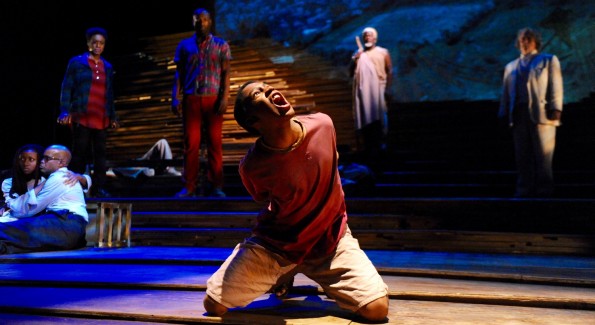Mosaic Theater’s ‘Unexplored Interior’ is a significant work that bit off more than it could chew.
“Unexplored Interior” is an earnest effort by actor/playwright Jay O. Sanders to expose the horror of the Rwanda genocide of 1994, but it is such a complex assignment he has undertaken that his play suffers from trying to accomplish too much. “Unexplored Interior” is in a debut performance that also marks the debut of the newly created Mosaic Theater Company in residence at the Atlas Performing Arts Center on rapidly developing H Street NW.
It is difficult for any playwright to attempt to examine the tribal murder of an estimated 800,000 Tutsis that occurred while the rest of world seemed indifferent to the Hutu slaughter of men, women and children in Rwanda. It was computed that there was an incomprehensible average of 333 people murdered every hour of every day, 24-hours a day, for 100 days.
These are chilling statistics of an African holocaust, and Sanders has attempted an understanding of the horror: the murder of all those Tutsis is a terrible statistic that can only begin to be understood by focusing on the frightening individual stories.
Any of the personal stories in the nearly three-hour production could have effectively stood alone, but the talented Sanders was so steeped in the bloody tragedy that the interweaving of his characters becomes confusing. There is too much to absorb and what he has created could have made a more efficient trilogy of plays.
The main focus of the story is of Raymond (Desmond Bing), a promising, naïve young Tusti who wants to be a documentary film–maker and travels to New York on a scholarship. He is there when the violence breaks out at home and eventually goes back to find that his beloved grandfather and almost all of his family and friends in his once pastoral village are gone.
Director Derek Goldman has assembled a smart cast more than capable of his complicated staging. There are several standout performances including Bill Grimmette as Felicien, Raymond’s grandfather and the respected village elder who is the wise keeper of his village’s lore and a man who loves his cattle — Tutsis are cattlemen and Hutus are farmers. The two tribes have been friendly neighbors, but the elusive friendships disappear when the violence begins after an airplane carrying the president of Rwanda and the president of Burundi is shot down and the Hutus blame the Tutsis.
One side story is that Raymond’s former girlfriend Cat-reen Bunyanyezi (Shannon Dorsey), is involved in an affair with a married Hutu official, Thomas Sibomana (Thomas Anthony Williams) who is sleeping with her while he also rails against Tutsis on his radio program, helping to agitate the violence.
There is also some confusion in having the same actor, Jeff Allin portray Alan, Raymond’s film-making mentor at New York University as well as portraying General Romeo Dallaire, a Canadian officer who is head of the small United Nations peacekeeping force in Rwanda. He is emotionally destroyed because he can’t get the support necessary to attempt to stem the violence and is unable to save any Tutsis.
One other confusing element thrown into the mix is the presence of the ghosts of Mark Twain, complete with white suit and cigar and King Leopold of Belgium. The characters are an unnecessary distraction on the crowded stage.
The Apex Theater has an especially effective auditorium and stage that Goldman uses to his advantage. The set by Luciana Stecconi with Harold F. Burgess II lighting and the sound direction of Christopher Baine evoke the starkness and terror of the Tutsi slaughter. The set is dark planks of wood stacked at different levels to accommodate the rapidly moving action. Against the back wall are projected a tranquil scene of the Rwandan hills, described as being one of the most beautiful countries on the continent. The horror of death and destruction that consumes this pacific country is evoked in the projected frightening flames of death and destruction in the final act.
What Sanders has created is significant and important. It anticipates the direction the new Mosaic Theater will be taking as it settles into the Apex Theater. What is special is to see that Ari Roth is back and is the founding and artistic director of the new Mosaic Theater after leaving Theater J after 18 years producing brilliant, provocative plays there.
“Unexplored Interior” continues through November 29 at Mosaic Theater, 1333 H St NE. Tickets are $15-$60 and available at 202-399-7993 or online here.





